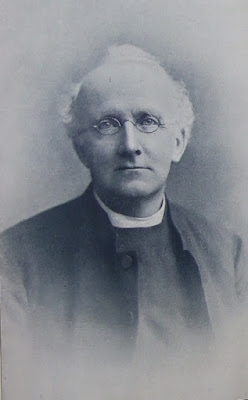Rev Samuel Haughton
Today is
the 120th anniversary of the death of Rev Samuel Haughton, but just
who was he?
 Samuel
Haughton was born in Carlow on 21 December 1821, and studied at Trinity College
Dublin. Haughton was elected a Fellow of Trinity in 1844, was ordained in 1847 and graduated as a doctor in 1862. As Registrar of the Medical School
in Trinity he did much to reform and improve it, and was the universities representative
on the General Medical Council for many years. As a Fellow of RCPI, Haughton
was one of the men responsible for the decision of the College to allow womento take the College’s exams, enabling them to practice as doctors.
Samuel
Haughton was born in Carlow on 21 December 1821, and studied at Trinity College
Dublin. Haughton was elected a Fellow of Trinity in 1844, was ordained in 1847 and graduated as a doctor in 1862. As Registrar of the Medical School
in Trinity he did much to reform and improve it, and was the universities representative
on the General Medical Council for many years. As a Fellow of RCPI, Haughton
was one of the men responsible for the decision of the College to allow womento take the College’s exams, enabling them to practice as doctors.
Haughton
was the archetypal Victorian polymath, he researched and published on wide
range of topics from blood pressure, to the age of the earth, to tides and
currents. With his colleague, Joseph Galbraith, he published a series of
textbooks on mathematics based subjects. The Galbraith and Haughton series of Manuals of
Mathematical and Physical Science were extremely
popular, in the words of one contemporary;
For many years, basic textbooks that were the product of their joint industry,
were current in all Irish schools; ‘‘Galbraith and Haughton’s Euclid’’,
‘‘Galbraith and Haughton’s Algebra’’, etc were the well planned avenues by
which most young Irish men were conducted to the mysteries of these sciences.
Haughton was such a prolific author that Charles Darwin, whose theories
on evolution Haughton attached, once ask how many Haughtons there where in Dublin.
In his 1866 publication On Hanging,
Haughton argued for a more humane approach to hanging. In many cases the
drop was not sufficient to break the neck and the condemned would suffer a slow
strangulation. Haughton calculated the length of drop needed for a quick break
of the neck, minimising pain and suffering. He published his results in 1866,
showing the various lengths of drop needed for different weights. He thus gave his name to a length of hangman’s
rope, ‘Haughton’s drop’.
Samuel Haughton died on 31st October 1897.